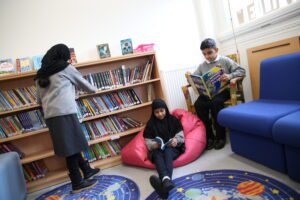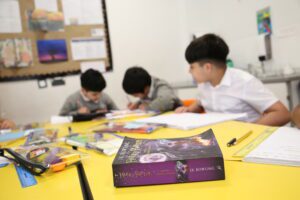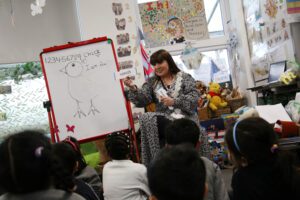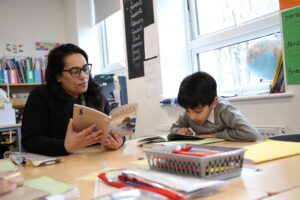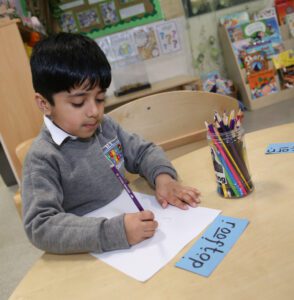English
English Leads: Emma Batt & Vicki Dickinson
Phonics Lead: Julie Farmery
EYFS Literacy Lead: Carol Griffiths
Overview
‘The National Curriculum in England: English programmes of study’ is followed in Years 1-6
The published programmes followed are:
-Little Wandle ‘Letters and Sounds’
-‘Pathways to Write’ (P2W) – includes speaking & listening, reading, writing, grammar, punctuation & spelling
-‘Rising Stars Spelling’ long-term plan
Handwriting – Penpals
Staff:
- model spoken and written standard English.
- model effective handwriting by following the school’s ‘Penpals’ handwriting style.
- consistently demonstrate accurate spelling, grammar, punctuation and handwriting.
Reading
At Stanley Grove Primary Academy, we believe in developing readers and make this aim a priority. We recognise that reading is the key to academic success and the intent of our reading curriculum is that everyone leaves us a happy, confident reader. This means they can read fluently, confidently and with understanding.
Many of our pupils start in our early years unfamiliar with traditional English stories and nursery rhymes. Their different cultural context and life experiences mean that as they grow up, many do not develop a rich vocabulary. Books offer all children an escape into other places, lives and times. That is why, at Stanley Grove, we put books at the heart of our curriculum and dedicate time every day for reading.
Early Years
The Early Year reading curriculum is delivered through a range of adult led activities in addition to the children developing their skills independently during continuous provision.
Nursery
Stories and rhymes are shared daily. Where these appear in the timetable varies. The daily teacher-led literacy session will be based on a text and include the sharing of the book (or part of the book). Songs and rhymes may also appear in literacy sessions but are also often part of teacher-led maths sessions. A story is shared at the end of the day. This may be a class favourite (selected from the ‘familiar read’ basket) or a book linked to the current curriculum theme (selected from the book corner).
Little Wandle Foundations Phonics is taught throughout the week. Children attend both small group and whole class sessions. The frequency and structure of these sessions change throughout the year as the children’s listening and attention skills develop.
Reception
| Strand | Purpose | Allocated time | Resources |
| Daily Little Wandle Phonics | Develop word reading and spelling | 25 minutes daily | Little Wandle Resource bank |
| Guided Reading lessons | Develop word recognition and fluency | 15 minutes sessions 3x a week | Little Wandle Big Cat books Matched to children’s phonics level |
| Storytime | Reading for Pleasure and modelling prosody | Daily | Class story time basket/box books selected by teacher and children Books linked to current curriculum theme displayed in the book corner |
Key Stage 1
The Key Stage 1 reading curriculum is delivered through a range of activities across each week.
| Strand | Purpose | Allocated time | Resources |
| Daily Little Wandle Phonics | Develop word reading and spelling | 30 minutes daily | Little Wandle Resource bank |
| Guided Reading lessons | Develop word recognition and fluency | 30 minutes sessions daily, 2 adult led and 3 independent. | Little Wandle Big Cat books Children not secure phase 5 phonics Little Wandle fluency books Children secure at phase 5 phonics Little Wandle e-books for home reading Texts shared on online platform after adult led sessions |
| Class reading time | Reading for Pleasure | 10 minutes daily | Little Wandle Phonics books linked to current level Non-fiction books linked to current learning School and Longsight Library books Book recommendations |
| Storytime | Reading for Pleasure and modelling prosody | 15 minutes daily | Class story time basket/box books selected by teacher and children Books linked to future learning |
| Book Club | An opportunity to discuss books, give reviews and share recommendations | Once a week for 10 minutes | Class library books School Library books Local Library books |
The Guided Reading Lesson
The focus for Guided Class Reading lessons is word reading and fluency. Groups work through a carousel of activities, with 2 out of 5 sessions being led by an adult each week. Adults follow a prescribed teaching sequence (see Appendix 1). Children read ‘Little Wandle Big Cat’ books matched to their phonics learning. Children have their own copy of the book and read independently in each session and, during adult led sessions, the adult ‘taps in’ to listen and provide feedback. Children may be asked to read aloud to the group to practise fluency and performance.
The initial session is led by the class teacher. Support staff then lead the second session. The purpose of the ‘follow-up task’ is for the children to independently demonstrate their comprehension of the text. The remaining two sessions are dedicated to further development of word reading and decoding skills linked to the current Little Wandle curriculum delivery and children’s phonic level. All staff delivering session record their assessment on the same proforma (see Appendix 4).
Example Key Stage 1 Guided Reading Carousel
| Group | Monday | Tuesday | Wednesday | Thursday | Friday |
| 1 | Guided Read 1 – teacher | Guided Read 2 – support staff | Follow up Task - independent | High Frequency Words - independent | Phonics/ Spelling - independent |
| 2 | Phonics/ Spelling - independent | Guided Read 1 – teacher | Guided Read 2 – support staff | Follow up Task - independent | High Frequency Words - independent |
| 3 | High Frequency Words - independent | Phonics/ Spelling - independent | Guided Read 1 – teacher | Guided Read 2 – support staff | Follow up Task - independent |
| 4 | Follow up Task - independent | High Frequency Words - independent | Phonics/ Spelling - independent | Guided Read 1 – teacher | Guided Read 2 – support staff |
| 5 | Guided Read 2 – support staff | Follow up Task - independent | High Frequency Words - independent | Phonics/ Spelling - independent | Guided Read 1 – teacher |
Key Stage 2
The Key Stage 2 reading curriculum is delivered through a range of activities across each week.
| Strand | Purpose | Allocated time | Resources |
| Whole Class Reading lessons | Develop reading comprehension and fluency | Daily lessons of 30 minutes | ’Complete Comprehension’ programme (Y3-6) – Non-fiction reading spine extracts |
| Guided Reading lessons (may take place during class reading time) | Develop word recognition and fluency | 20 minutes sessions a minimum of once a week for pupils working towards or below their year group’s age related expectations. | Little Wandle Big Cat books – children not secure phase 5 phonics Little Wandle fluency books – children not yet ready to access Age Related text Extracts from books linked to future learning Little Wandle e-books for home reading Texts shared on online platform after adult led sessions |
| Class reading time | Reading for Pleasure | Minimum 3 x weekly for 20* minutes *Y4 less due to Swimming | Accelerated Reader books Non-fiction books linked to current learning School and Longsight Library books Book recommendations |
| Storytime | Reading for Pleasure and modelling prosody | Minimum 3 x weekly for 20 minutes | The class novel (selected by pupils and teacher) Books linked to future learning |
| Book Club | An opportunity to discuss books, give reviews and share recommendations | Once a week for 20 minutes | Class library books School Library books Local Library books |
The Whole Class Reading Lesson
The focus for Whole Class Reading lessons is reading comprehension. Adults follow a prescribed teaching sequence. A separate unit is taught each week. During a six week half term, four weeks are timetabled for teaching a ‘Complete Comprehension’ unit (detailed planning is provided) and two weeks are timetabled for delivering a lesson using an extract from a non-fiction reading spine book (planning produced by teachers).
The Guided Reading Lesson (Lower Attainers only)
The focus for Guided Class Reading lessons is word reading and fluency. Lower attainers have a guided reading focused session with the teacher every week as a minimum. Adults follow a prescribed teaching sequence. In all sessions, children have their own copy of the book and read independently at their own pace and the adult ‘taps in’ to listen and provide feedback. Children may be asked to read aloud to the group to practise fluency and performance. Lower attainers read a ‘Little Wandle fluency book’ (matched to their word reading) and learners still not secure phase 5 in Little Wandle phonics read a ‘Little Wandle Big Cat’ book matched to their phonics learning. Children may complete a pre-read task that prepares them for their focus session with an adult the following day. They may also complete a follow-up task that revisits and reinforces their learning in the focus session. However, in some year groups, an adult works directly with the group on consecutive days, so there are no independent pre-read and post-read activities or independent reading for pleasure is prioritised over pre-read and post-read tasks.
Reading Interventions:
–Reading Accuracy; Fischer Family Trust Wave 3, Boosting Reading @ Primary (BRP), additional Guided Reading
–Reading Comprehension; On Track English Reading Comprehension (Rising Stars), Reading Between the Lines (Delamain & Spring), Inference at KS2 (Leicester Learning Services),
Writing
Early Years
Nursery and Reception base their teaching around books, chosen for the way they develop reading behaviours, teach structure of texts or teach rhythm and rhyme. Listening to stories and learning traditional songs and rhymes helps children develop their repertoire. This in turns helps them become good writers as they are full of story ideas and understand the structure of sentences. Adults model writing in many ways, both to the whole class and in small group or 1:1 settings. In Early Years, teaching phonics lays the foundations for children to become writers. As they ‘grow-the-code’ of grapheme-phoneme correspondences, they are able to commit their creative ideas to the page.
Key Stage 1 & 2
In Years 1-6 we follow the Pathways to Write (P2W) programme, which is adapted to meet the needs of the children. Each unit is focused around a high-quality, age appropriate picture book. There are 6 units per year group, lasting approximately 3-4 weeks, leaving additional time for writing linked to the wider curriculum and special events, such as writing a report following a class visit. Half termly objectives remain the same throughout a half term (the mastery approach).
P2W Objectives are referred to as:
Gateway keys – objectives from earlier year groups
Mastery keys – year group objectives
Feature keys – objectives linked specifically to the genre
P2W Gateway Tasks:
- Each unit begins with a ‘Gateway Task’, used to identify; children not yet secure in the basic skills (Gateway Keys), gaps in learning for most children; next steps in teaching.
- Adjustments are made to children’s objectives/ keys/ success criteria to reflect their individual next steps and to avoid overload for the child eg. a Y5 child may be given Y4 objectives (gateway keys) as their focus when writing.
P2W Final Writing Outcome:
- Is marked by the teacher, ideally with the child present.
- Children are shown how to improve their writing and are given the opportunity to make the necessary changes.
- Space in the child’s book allows for the changes to be made.
- Children are encouraged to write freely and avoid ‘shoe-horning’ features into their writing e.g., over-use of extended noun phrases, resulting in writing that does not flow or make sense – success criteria can be shared part-way through the independent writing process.
Independent Writing
Writing is independent even when children are provided with support materials, as they decide how to use the supporting information in their writing. Children are encouraged to use:
- English Folders (containing reference sheets/ scaffolds)
- Vocabulary lists on the working wall e.g., a list of extended noun phrases
- Key vocabulary
- Descriptosaurus sheets
- Word Mats
- Phonic Mats
Writing Intervention – Pathways to Progress (P2P)
- Runs alongside the P2W unit and focuses on the Gateway Keys
- Groups of 4
- 3 x 20/30 minute sessions each week
- Progress is reviewed termly
Spelling
- The ‘Rising Stars Spelling programme’ long-term plan is followed consistently, ensuring complete content coverage across all year groups. Resources from a range of sources are used when delivering lessons.
- Spelling boards are updated weekly and reflect the current class spelling rule and/ or a list of spelling words.
- Independent practice and application opportunities are provided during lessons.
- Children are encouraged to keep a personalised list of focus spellings to refer to when writing, proofreading and editing.
- Spelling is a focus for development and improvement during the academic year 2022/23.
Handwriting
The ‘Penpals ‘handwriting programme is followed throughout school. Penpals helps us to teach the children to develop fast, fluent, legible handwriting. It links to the guidelines in the National Curriculum for England and Wales. Using Penpals ensures a coherent whole-school approach to continuing to improve handwriting standards.
|
|
One Page Overview – Writing
|
|
|
One Page Overview – Reading
|
|
|
One Page Overview- Phonics
|
|
|
Comprehension Teaching Sequence
|
|
|
Overview of objectives Y1
|
|
|
Overview of objectives Y2
|
|
|
Overview of objectives Y3
|
|
|
Overview of objectives Y4
|
|
|
Overview of objectives Y5
|
|
|
Overview of objectives Y6
|
Parry Road, Longsight
Manchester M12 4NL
Call us: 0161 224 9495
Link takes you to our Twitter page @StanleyGrovePA




